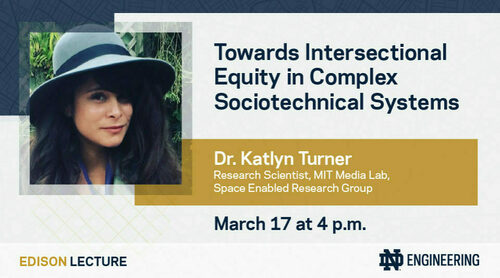
Katlyn Turner will deliver a Notre Dame Engineering Edison Lecture, “Towards Intersectional Equity in Complex Sociotechnical Systems,” at 4 p.m. EDT March 17.
This virtual presentation is free and open to the public. Register here.
Turner is a research scientist at the MIT Media Lab in the Space Enabled group, a Research to Policy Engagement fellow at MIT’s Technology and Policy Program and a research associate at the Project on Managing the Atom at the Harvard Kennedy School’s Belfer Center for Science and International Affairs.
Her research is concerned with the ways in which complex systems and technology often exacerbate social hierarchy and inequity — whether it’s nuclear waste management affecting small communities’ safety and land rights, data and algorithms inappropriately categorizing individuals from lower socioeconomic backgrounds, or innovation practices and products producing racist products and results. She is interested in the design of processes and policies that promote justice and equity, particularly for historically underprivileged groups.
Turner earned her doctoral degree in 2017 from Stanford University’s School of Earth, Energy and Environmental Sciences. She is a 2012 graduate of the University of Notre Dame, where she earned a bachelor's degree in chemical and biomolecular engineering. She grew up in the area surrounding South Bend, Indiana, and she attended Penn High School before heading to Notre Dame.
Complex sociotechnical systems are embedded within the systemic inequities that plague society — for example, racism, classism, sexism and so forth. Unless technology and its norms of use and governance are developed and implemented with the explicit goal of creating and sustaining intersectional equity, the impacts of these systems will continue to be disproportionate; certain groups will systematically benefit from them, while other groups are systematically harmed, regardless of intent.
In this talk, Turner will discuss examples of equity and inequity within broader society, including in the ongoing response to the COVID-19 pandemic in the U.S. and its disparate effects along lines of class, race and infrastructure (focusing on Greater Boston); and the exclusionary cultures and demographics uplifted and amplified in STEM and innovation (focusing on Greater Boston and Detroit Metro). Further, within the nuclear and aerospace fields specifically, she will consider the question of equity through examining technologies and field-specific norms across scale.
This event will be moderated by Peter Burns, the Massman Professor of Civil and Environmental Engineering and Earth Sciences and director of ND Energy. It will include a welcome from Patricia J. Culligan, the Matthew H. McCloskey Dean of the Notre Dame College of Engineering.
The Edison Lecture Series was established in 1989 by the Charles Edison Fund with the goal of stimulating interest in and encouraging participation in science and technology.